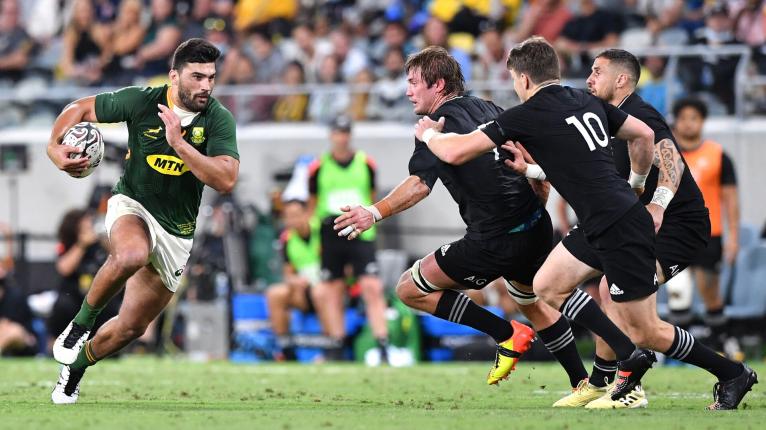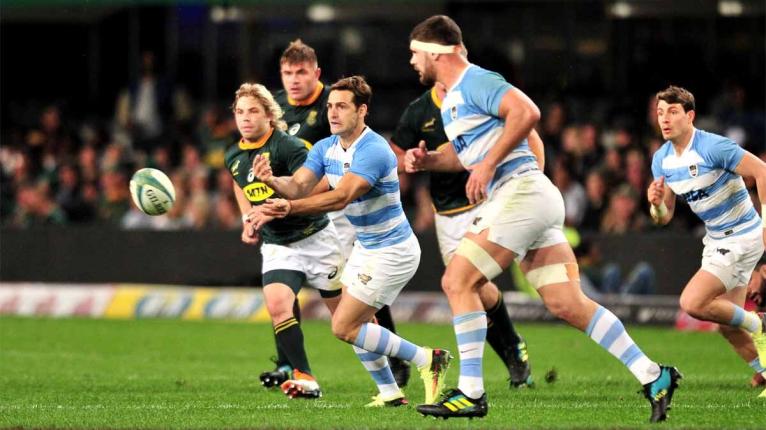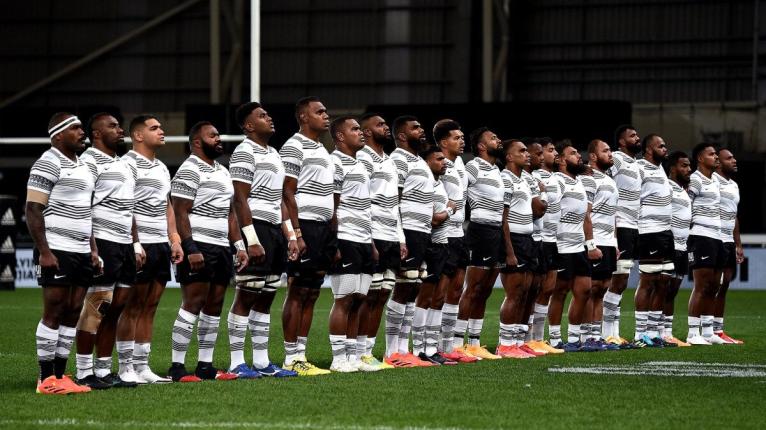For obvious reasons, the Southern Hemisphere has not been focused on strategic objectives for the Rugby Championship these past two years.
The arrival of Covid and the impact of travel restrictions and quarantine has meant that those south of the equator have had to scramble to put any kind of competition together since 2020.
This year was especially tense as to whether the Rugby Championship would even go ahead after Covid hit both New Zealand and the east coast of Australia just weeks before the competition was due to start.
There was a tense period just days before all three of New Zealand, Argentina and South Africa were due to fly into Australia, when the tournament was genuinely in doubt.
That a credible and at times compelling tournament was cobbled together was in fact a small miracle and credit due to all those who did their bit in finding a way to make it happen.

But now that a less disrupted future looms, the focus needs to change. Next year it is probable that there will be fewer travel restrictions across the globe and therefore a relatively normal schedule can resume.
It is expected that the Rugby Championship will be able to return to its traditional format of home and away tests, but with the twist that we would have seen in 2020 had it not been for the pandemic.
New Zealand and Australia will play each other home and away, as will Argentina and South Africa. But South Africa and Argentina will no longer come to both New Zealand and Australia in the same trip and instead will play two tests in one of those nations and then return home, to host two tests against whichever of the two they didn’t play on the road.
It’s a change designed to reduce travel and cut costs rather than necessarily invigorate the tournament, but it probably will do the latter.
The question that needs to be asked, though, is what does the longer-term future of the Southern Hemisphere look like in specific regards to the Rugby Championship?
Not only have Argentina mostly finished last, since 2012, the All Blacks have won eight titles.
Club rugby appears to have a road map now that a format and financial structure has been agreed for Super Rugby Pacific.
South Africa have effectively migrated their provincial allegiance to the Northern Hemisphere but remain adamant that at international level they are committed to the Rugby Championship.
Argentina have been cut adrift from Super Rugby and forced to revert to their players being contracted to clubs all over the world – but mostly in Europe.
It all feels a little precarious. How Argentina are going to get better is hard to see when they will be pulling players out of Europe and then throwing them into battle against the ruck and run All Blacks and Wallabies.
They are brave, resourceful and resilient but the Pumas have struggled to be a genuine force at this level and were well beaten six times in 2021.
And herein lies one of the competition’s biggest problems – it lacks unpredictability. Not only have Argentina mostly finished last, since 2012, the All Blacks have won eight titles. In the years the competition has been played out in full, 2012 to 2014, 2016 to 2018 and 2021, they have only lost three tests and drawn once.

All Blacks domination is one problem, but so too is the fact that the competition isn’t played in full in World Cup years. That’s not a sustainable proposition – it’s too disruptive and has prevented a strong sense of identity and meaning from building.
It’s actually worse than that because in New Zealand, at least, the public have not fallen in love with the Rugby Championship and often don’t seem to understand what it is or how it works.
To most New Zealand followers the Rugby Championship is seemingly a series of individual tests that don’t necessarily play out within the context of an overall competition.
Everyone gets the Bledisloe Cup but doesn’t always understand or even realise that it sits inside the Rugby Championship.
This year was a perfect example of how little traction the tournament has as even the media called the test in Perth a ‘dead rubber’ when it was in fact critical in the context of the Rugby Championship.
it is undeniable that the global finances of the sport are broken and the root cause is that game has failed to grow the high-performance capabilities of emerging nations such as Japan, USA, Canada, Georgia and Fiji to make them genuine contenders on the world stage.
It was the same when the All Blacks played the Springboks in Townsville – there was no appreciation that Jordie Barrett’s last-minute penalty secured the title and not just victory on the night.
In short, the Rugby Championship has not grabbed the public’s imagination or won the sort of profile it expected. The evidence to support that lies in the respective balance sheets of the member unions – all of which have been under duress in the last few years, but none more so than Rugby Australia, which sits close to insolvency.
This is not a problem confined to the Southern Hemisphere. The Six Nations has had to sell off part of the estate, so to speak, to private equity firm CVC and after 25 years of professionalism, it is undeniable that the global finances of the sport are broken and the root cause is that game has failed to grow the high-performance capabilities of emerging nations such as Japan, USA, Canada, Georgia and Fiji to make them genuine contenders on the world stage.
Rugby is dominated today by the same eight nations – New Zealand, Australia, South Africa, England, Ireland, Wales, Scotland and France. It has been for the last century and as a consequence, hasn’t found new sources of income and has chronically under invested in the sport.
If there is to ever be enough capital to change the financial cycle from a hand-to-mouth existence to one of long-term growth and capital investment, there has to be a broader, global footprint and the Southern Hemisphere needs to be part of a bigger eco-system and specifically, one which includes the commercial heft of the USA and Japan.
New Zealand Rugby, at least, is certain that it wants to see those two nations and indeed Fiji become part of the Rugby Championship in the near to mid future.

Australia largely agrees and neither South Africa nor Argentina would dispute that the long-term goal for the Southern Hemisphere should be to redefine the Rugby Championship so it carries greater significance and with it, wins a wider fan base and broader range of commercial support.
However, this will require a unified vision and strategy. It will require an independent body to lead the four nations to this promised land and that’s a major concern because the current administrator and driving force, Sanzaar, has proven to be wildly ineffective.
In the last year or so there have been sporadic proclamations about Japan and Fiji coming on board, but no timelines, pathways or clear sense of how they could be phased in so they are not horribly exposed.
Instead, there have been big picture statements that are vague and riddled with mixed messages. “In order to take the discussions [about Japan] into a decision, we [the Sanzaar nations] have a commitment to play the Japanese on a more frequent basis and using that over the next couple of years as a performance metric,” former Sanzaar CEO Andy Marinos said earlier this year.
“The Japan – or any expansion – opportunity would be something we’d look at post the World Cup [in 2023]. We had looked at trying to set up an emerging nations competition, and have our respective ‘A’ teams playing in that competition.
Essentially Sanzaar is a clearing house or, possibly more accurately, a travel agency, tasked with doing nothing more than booking flights and accommodation.
“Let’s not kid ourselves, coming into a Sanzaar relationship, you’re putting yourself up against arguably three or four of the best teams in the world, on their given day.”
The reason for this lack of clarity is that Sanzaar is an enigma. No one really knows what it is. Headquartered in Sydney it has independent staff, yet they have no obvious decision-making powers.
Essentially Sanzaar is a clearing house or, possibly more accurately, a travel agency, tasked with doing nothing more than booking flights and accommodation.
It’s a fallacy to think of it in any other way because the Southern Hemisphere still operates like this: the key executives from the four member unions meet up every now and then to bicker about the future, go round in circles and never manage to agree on any kind of strategic path for the Rugby Championship.
It has become clear that if Japan and Fiji and in time, the USA, are to join the Rugby Championship, they can’t sit around waiting for Sanzaar to make it happen.
It’s ineffective at the best of times, which these are not, because the key relationship between New Zealand and Australia is fractured.

These two are barely on speaking terms after NZR unilaterally blew up Super Rugby last year. They took an age to piece it back together again this year amid various public slanging matches between themselves and RA, which exploded into incandescent rage when the All Blacks didn’t initially travel to Perth to fulfil the third Bledisloe Cup fixture at the end of August.
The two unions distrust each other and their relationship will face a huge test when the time comes to vote for the 2027 World Cup host – as Australia have made a bid.
“I’m not sure Brent [former NZR chair Impey] would have supported us, but Stewart Mitchell is a good guy, an old school Kiwi, and I’d be disappointed if they didn’t support us under his regime,” RA chair Hamish McLennan told the Sydney Morning Herald recently.
“We did the honourable thing [in agreeing to play two tests in Auckland this year], but in hindsight that was a mistake, considering they pulled Perth.”
Clearly NZR and RA are not in a position where they can work effectively together as part of the Sanzaar alliance and so the question is who can unify Southern Hemisphere rugby and drive it in the direction it needs to be going?
There is opposition from the players to the deal in New Zealand but perhaps they will come to see an agreement with Silver Lake not so much as a transaction, but as a means to reshape Southern Hemisphere rugby.
And the answer, just as it as in the UK, is private equity. It may well be that Silver Lake, the US investment firm that has made an offer to buy a stake in NZR, becomes the strategic driving force south of the equator.
RA has made it clear, given its weak balance sheet, that it will do a private equity deal in the next few months.
“We are under capitalised,” McLennan said recently. “We still need more. We’ve underinvested for 15 years.”
NZR has an offer and Silver Lake have suggested they are keen to invest in Japan, Fiji the USA and possibly even in South Africa.
There is opposition from the players to the deal in New Zealand but perhaps they will come to see an agreement with Silver Lake not so much as a transaction, but as a means to reshape Southern Hemisphere rugby.
If Silver Lake could acquire stakes in all the various Southern Hemisphere and Pacific Rim countries, the game here would have the driving force it needs to build a strategic vision, redefine the Rugby Championship and change the economic profile for good.


Thanks for replying to my question. I suppose autonomy and identity play a bigger role. Hopefully they can come to an agreement.
So the message here is ‘money fixes everything’. Honestly, I despair. The silver lake deal is an astonishing bad idea, they will play NZ rugby like a fiddle. The players know it. Anyone who thinks private equity is a benevolent force has not been paying attention to the state of the world.
This could come back to haunt me but from what I've read Silver Lake offered NZR a good price and reasonable assurances that they'll leave on field and cultural issues to us. If they do the same for the Rugby Championship then fair enough. Good TV deals in Japan and the US could be key.
You talk sense Gregor which is more than NZR and RPA have been doing for a year. If someone could bang their collective heads together ,send them both to the naughty corner for a week then invite SILVER LAKE back to talk to both at the same time...something might happen....... that the remainder of the Pacific Rim may also benefit so that the SH has a competition that in time could outdo a tiring 6-N and give all our less moneyed unions chance to compete with greater equity in World Rugby. 🙃 😎
Pardon my ignorance, but what does the Silver Lake investment in NZR entail?
Silver Lake will pay NZ a lump sum of several million $NZ in exchange for a share of the All Blacks' commercial revenues. These include the rights from TV broadcasts, stadium gates, etc.